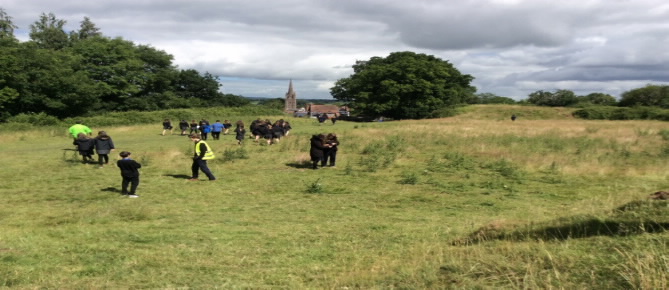Our aim is to provide pupils with an interesting and relevant learning experience. With the ability to discuss  current affairs and relate them to historical events.
current affairs and relate them to historical events.
Providing pupils with a wide range and varied curriculum which provides a balanced History diet, including pre 1066, British, wider world and local History. Extra-curricular trips include visiting the Motte and Bailey Castle in Weobley at KS3 and a tour of Shrewsbury Prison at KS4.
Pupils have 1 hour of History in year 7 and two hours in year 8 and 9. At KS4 pupils have 2/3 hours of History. KS4 pupils study the Edexcel GCSE syllabus. Please see the department’s learning journey for a full list of topics studied throughout KS3 and KS4.
“Those who fail to learn from History are condemned to repeat it.”
(28 Aug 2014) Winston Churchill
The History curriculum at Weobley High School is designed to provide all pupils with an interesting and relevant learning experience accessible to all with the ability to discuss current affairs and relate to historical events. The department provides a wide range and varied curriculum which provides a balanced History diet, including pre 1066, British, wider world and local History.
The History department aims to create a big picture which helps pupils to see:
- Why things have happened.
- How, when and why change happens.
- History is not the past.
- Significance.
- Differing views and interpretations.
- Creating oral and written sophistication.
The History department also aims to develop all students’ cultural capital which involves opportunities for discussion, debate, exploration of ideas, independent responses to new material, individual research and development of own lines of enquiry. Extra-curricular activities are also important for developing cultural capital and opportunities are provided for all pupils.
Our curriculum is designed to produce well-rounded young citizens who are equipped with the skills, knowledge and understanding to successfully pursue further study or employment. We have developed a range of opportunities to develop the literacy and numeracy skills of our pupils, including extended writing, which will develop skills such as reasoned argument and substantiating judgements.
The History curriculum has been developed using the National Curriculum guidance and by considering the students in our school community. The curriculum is planned and sequenced to ensure that study material is accessible to all learners. It has knowledge and skills at the heart of its design. Pupils will be able to develop disciplinary knowledge, such as cause and consequence, historical significance, sources and evidence, historical interpretations and narrative accounts. Pupils will also build upon their substantive knowledge throughout their time at KS3 and in to KS4. Pupils are taught chronologically, whilst identifying themes within the curriculum to enable them to make links throughout kS3 and KS4.
Our curriculum provides stretch and challenge across the curriculum, providing opportunities for independent and collaborative learning. The challenging and interesting curriculum we provide is supported by a range of effective teaching techniques. We continually revisit prior knowledge and skills to ensure all pupils can progress and develop. This ensures that pupils possess a solid grounding on which to support their Key Stage 4 examinations and beyond.
At Weobley High School the impact of the History Curriculum will be such that:
- Pupils will leave with a deep and sustained knowledge and understanding of British, wider world and local History. They will be able to communicate ideas with confidence and will be critical thinkers, able to reflect and consider multiple viewpoints. This will be reflected in national examination results and the progression shown by the individual learners.
- Pupils will feel prepared for the next transition into education or employment and will have confidence in the subject, having embedded, developed and applied knowledge and skills learned from Key Stage 3 to Key Stage 4.
We assess this impact by the regular monitoring of our teaching and the assessment of pupils’ learning and understanding. Assessments may happen in a range of ways, such as through questioning, short tests, longer synoptic tests, extended writing, decision-making exercises, and self- or peer-assessment. Teachers are clear about the assessment criteria, which both helps pupils to improve their attainment and motivates them. Assessments are designed so that teachers can identify specific gaps in pupils’ knowledge and any misconceptions.
We measure the impact of our curriculum in a variety of ways including:
Learning walks/lesson observations and professional dialogue with teachers.
Book Monitoring.
Pupil engagement and teacher feedback.
Interviewing pupils about their learning.
Improved subject vocabulary.
Pupil and teacher progress tracking.
Attainment and achievement outcomes.
Attendance and behaviour data.
